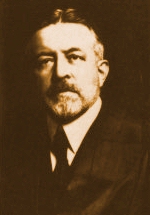
Edward Terry Sanford, a forty-one year old Harvard-educated attorney from Knoxville, was selected by Attorney General Charles Bonaparte to be the lead prosecutor for the Justice Department in the trial of Sheriff Shipp and others accused in connection with the lynching of Ed Johnson. At the time of his selection, Sanford served as Special Assistant Attorney General. His job was to prosecute high profile criminal cases around the country.
As lead prosecutor in the Shipp case, Sanford prepared the case for trial and took the lead role for the government in preparing the case and examining and cross-examining witnesses in Chattanooga. It was Sanford who spent the better part of two days cross-examining Shipp concerning his alleged role in the lynching. After the evidentiary phase of the trial, Sanford told friends that he thought he had proved the case against Shipp, some of his deputies, and a handful of members of the lycnh mob. He acknowledged that other defendants had not been shown to be guilty beyond reasonable doubt. When the trial shifted to Washington for final arguments before the Supreme Court, Attorney General Charles Bonaparte took it upon himself to offer the summation for the United States.
Soon after the Shipp trial, a vacancy opened on the federal bench in Chattanooga. Justice Harlan suugested that Sanford be nominated for the post. The aging Justice reportedly told President Roosevelt, "Could you do better than put in Sanford?" As a federal district court judge, Sanford gained a reputation as a firm--but fair and courteous--judge. In 1923, President Warren G. Harding elevated Sanford to the Supreme Court. Sanford wrote 130 opinions for the Court before his death in 1931 from uremic poisoning after having a tooth pulled. Oliver Wendell Holmes, learning of Sanford's death, called him "a faithful worker, born to charm."
